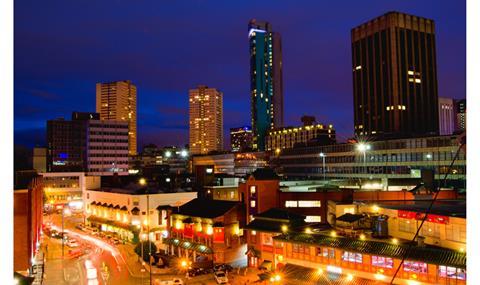
Birmingham City Council is reviewing the £100 per visit charge for pre-Euro-6 HGVs proposed for its clean air zone (CAZ) planned for January 2020 and may reduce it when it submits its final plan to government at the end of 2018.
Speaking at the inaugural Birmingham Transport Conference organised by consultants Invergold Associates, Waseem Zaffar, the Labour cabinet member for transport and environment on Birmingham City Council, said the CAZ was being imposed on Birmingham by central government.
He said it was “passing the buck” to cities, and while the council wanted to protect residents from the ill effects of poor air quality, this should not be at the expense of jobs and businesses in the city.
“We have not finalised the figures,” he confirmed. “We were basing them on London, but we will set the charges in our full business case in December. We need a national approach to charging as we do not want the CAZ to damage business.”
Retrofit funding
Birmingham is asking for £36m funding to help mitigate the effects of the CAZ on local businesses and residents, and is proposing to allocate £15,000 per HGV to either fund a retrofit or replacement to Euro-6 standards.
“If we do not get the full £36m mitigation funding we will review the scheme,” said Zaffar. “We understand the pressure the speed of this is causing but that is down to the government.”
Zaffar said Birmingham was expanding and its population was expected to increase by 150,000 by 2031, resulting in a forecast two million more car journeys in a city already over-reliant on car transport as a result of significant under-investment in public transport.
Read more
- Veolia’s retrofit trial sees Euro-5 refuse trucks achieve clean air zone compliance
- HGVs face £100 charge in Bath Clean Air Zone proposals
- Leeds City Council publishes final clean air zone plan
“The city is blighted by health inequality,” said Zaffar. “There are 900 deaths a year linked to man-made air pollution and transport contributes 80% of NOx emissions. NOx is the biggest challenge we are addressing with the CAZ.”
He said studies showed that 60% of vehicles entering the proposed CAZ were compliant with the standards required, so only 40% would have to pay the charge or be upgraded.
The start of it
The UK is being forced by the EU to introduce measures to reduce NOx levels to the legal limit of 40 micro grammes/cu m of air. But Zaffar warned that achieving this limit by 2020 was “not where we stop, it’s where we start” and pressure would continue to move towards low and zero emissions vehicles.
“This CAZ is just the start,” he said. “We want to be a clean air city.”
Sylvia Broadley, Birmingham City Council’s air quality manager, went on to explain that Birmingham’s CAZ will be a category D zone affecting all vehicles moving inside the A4540 ring road and enforced by automatic number plate recognition cameras.
She said the short period leading up to its introduction was due to the urgency imposed by the need to meet legal air quality standards after the government was taken to court and given just two years to act.
The council held a formal consultation in the summer that received more than 10,000 responses, but it is continuing to listen to representations as it finalises a plan for submission to government in December. “We acknowledge this is extremely challenging and we want to continue a dialogue with businesses,” Broadley said.
Vehicle upgrades
Responding to queries about the lack of availability of retrofit technology for HGVs, Broadley said the Clean Vehicle Retrofit Accreditation Scheme would soon be listing approved installers able to upgrade older vehicles to Euro-6. The council is also proposing to exempt Euro-5 vehicles with existing finance arrangements from the charge for up to two years as they had “been bought in good faith”.
As part of its ultra-low emissions ambitions, Birmingham is creating the Tyseley Energy Park where hydrogen, biodiesel, LPG, CNG and electric vehicle charging will be available from April 2019. “We urge operators to go beyond Euro-6 and look at biodiesel,” said Broadley. “More sites are planned in the city centre and on key routes.”
Image: Shutterstock














